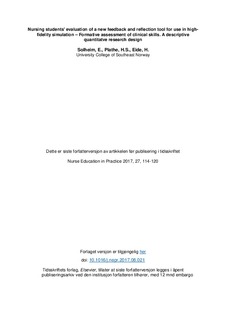| dc.contributor.author | Solheim, Elisabeth | |
| dc.contributor.author | Plathe, Hilde | |
| dc.contributor.author | Eide, Hilde | |
| dc.date.accessioned | 2017-10-02T12:11:38Z | |
| dc.date.available | 2017-10-02T12:11:38Z | |
| dc.date.created | 2017-08-07T14:25:18Z | |
| dc.date.issued | 2017 | |
| dc.identifier.citation | Nurse Education in Practice 2017, 27, 114-120 | nb_NO |
| dc.identifier.issn | 1471-5953 | |
| dc.identifier.uri | http://hdl.handle.net/11250/2457732 | |
| dc.description.abstract | Graduate nurses show a lack of expertise in clinical skills (Bradshaw and Merriman, 2008, Higgins et al., 2010). There is a need for major education changes to enable nursing students to meet future healthcare challenges (Benner et al., 2009), for which the requisite specialization and expertise are constantly changing, and a person-centred perspective in nursing is expected (McCormack and McCance, 2010).
Clinical skills are complex. They involve the ability to perform an action with care based on theoretical and practical knowledge, communication skills, and ethical and moral considerations tailored to the individual patient’s needs (Bjørk, 1999, Ministry of Education, 2008). This article will focus on clinical skills training in a clinical skill. The learning takes place in small groups guided by different teachers. In our education programme at University College of Southeast Norway (HSN), we saw that a common understanding of learning outcomes and clinical skills’ characteristics optimizes learning. This clarification was important for both students and teachers. Nicol and MacFarlane-Dick (2009) argue that to be successful in formative assessment and promoting student learning in higher education, a robust conceptual framework and principles of good feedback practice must underpin students’ clinical skills. To learn the complexities of a clinical skill, all the individual aspects of the skill need to be identified and made visible to students and teachers (Hattie, 2012). | nb_NO |
| dc.language.iso | eng | nb_NO |
| dc.rights | Attribution-NonCommercial-NoDerivatives 4.0 Internasjonal | * |
| dc.rights.uri | http://creativecommons.org/licenses/by-nc-nd/4.0/deed.no | * |
| dc.title | Nursing students’ evaluation of a new feedback and reflection tool used during high-fidelity simulation in the formative assessment of clinical skills – A descriptive quantitative research design | nb_NO |
| dc.type | Journal article | nb_NO |
| dc.type | Peer reviewed | nb_NO |
| dc.description.version | acceptedVersion | nb_NO |
| dc.source.pagenumber | 114-120 | nb_NO |
| dc.source.volume | 27 | nb_NO |
| dc.source.journal | Nurse Education in Practice | nb_NO |
| dc.identifier.cristin | 1484581 | |
| dc.relation.project | Norges forskningsråd: 226537 | nb_NO |
| cristin.unitcode | 222,90,3,0 | |
| cristin.unitname | Institutt for sykepleievitenskap - Drammen | |
| cristin.ispublished | false | |
| cristin.fulltext | postprint | |
| cristin.qualitycode | 1 | |

